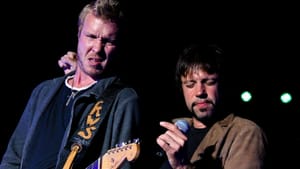Stay in the Loop
BSR publishes on a weekly schedule, with an email newsletter every Wednesday and Thursday morning. There’s no paywall, and subscribing is always free.
So you want to be a rock-and-roll god
Kenny Wayne Shepherd and Robert Randolph at the Keswick

Not every great guitarist can be a guitar god. Here's what you need to do:
1. Play the guitar well. Like really, really, well. Amazingly well. Phenomenally well. Mind-blowingly well.
2. Play an electric guitar — virtuosity on an acoustic guitar won't cut it. (Sorry, John Fahey.) Once your godhood has been established, of course, you may pull out an acoustic for a song or two in the middle of a killer set.
3. Play within a genre with a strong rock element, however mixed the other influences. Actually, the more additional influences — blues, jazz, world music — the better. Pure jazz, alas, disqualifies you. (George Benson fans: The comments form is at the left on this page.)
4. Perform and record under your own name, though you may, if your backup band is unusually solid, acknowledge that by performing as "The [Your Name Here] Band." You may wonder, does this mean Clapton didn't actually attain rock god status until he went solo in the '70s? Yes, that's exactly what it means. Note: Some regard this requirement as arbitrary, because it in fact disqualifies brilliant guitarists whose technique would otherwise make them shoo-ins for rock god status, like Keith Richards and Jimmy Page, but there should be no ambiguity about the name of the headliner.
All of these requirements are fairly straightforward, though I'm prepared for whining from fans of guitarists who fail to meet one or more of them. The last requirement, however, is where wannabe deities can get into trouble:
5. Think through how you'll handle vocals. Basically, you've got three options:
a) You can do your singing yourself. You don't need to be as good a singer as you are a guitarist — hell, it's probably impossible for you to be — but a good-enough voice (and a fair amount of personality) will suffice. If you can't play guitar and sing at the same time: no biggie, neither can B. B. King.
b) You can skip the vocals completely and go instrumental. This is a less-common strategy, but it can be extremely effective, as we heard from Jeff Beck in the Blow by Blow / Wired era of the '70s. John McLaughlin has also gone the no-vocals route at several points in his career.
c) You can hire a lead singer. This is the most common option, but it's also the most fraught. Basically, you've got two choices: Pick someone with a killer voice and tons of charisma, or pick someone with the right voice who's willing to step in and out of the performance as just another member of the band.
Jeff Beck, when he's not all-instrumental, has usually gone with the first strategy: One of his earliest bands featured Rod Stewart as lead singer, and more recently, he's worked quite a bit with jazz/rockabilly singer Imelda May, a woman who's not averse to the spotlight. (Click here for their gorgeous "Cry Me a River.") An example of the second strategy is Derek Trucks, who hired Mike Mattison because of the distinctive bluesy rasp of his voice, his versatility, and his ability to function as a member of the combo rather than a frontman for the group.
Whichever approach to the vocals the guitar god takes, his or her (thank you, Bonnie Raitt, for cracking open that men's club) first obligation is to the fans: When they want to see a guitar god live, they want to see the guitar god, not some other tool stepping into a spotlight he or she is not worthy to share.
Are they ready for their apotheosis, Mr. DeMille?
Two candidates for guitar godhood appeared at the Keswick Friday night, pedal steel monster Robert Randolph and former blues prodigy Kenny Wayne Shepherd, celebrating his 37th birthday.
 Both men are fine on points #1 through #4. Randolph taught himself to play the pedal steel guitar he heard growing up in the Pentecostal Church. When he went secular, he added elements of blues, funk, and soul to the gospel base. He performs mostly with the Family Band, so named because it includes his cousins Danyel on bass and Marcus on drums, plus a keyboardist, rhythm guitarist, and backup singer. He's emphatically the star, though, handling the lead vocals, so he's also fine on point #5. On Friday, he delivered a solid, well-paced set, playing mostly his own compositions but also a few covers, including Jimi Hendrix's "Foxy Lady."
Both men are fine on points #1 through #4. Randolph taught himself to play the pedal steel guitar he heard growing up in the Pentecostal Church. When he went secular, he added elements of blues, funk, and soul to the gospel base. He performs mostly with the Family Band, so named because it includes his cousins Danyel on bass and Marcus on drums, plus a keyboardist, rhythm guitarist, and backup singer. He's emphatically the star, though, handling the lead vocals, so he's also fine on point #5. On Friday, he delivered a solid, well-paced set, playing mostly his own compositions but also a few covers, including Jimi Hendrix's "Foxy Lady."
Kenny Wayne Shepherd is also self-taught; he started playing guitar when he was seven, soon after seeing Stevie Ray Vaughan live. He began performing at 13 and got his first record contract soon after; he started charting hits at 18. Hailed as a prodigy, he's matured into a talented guitarist (#1, check), who plays a Kenny Wayne Shepherd Signature Series Stratocaster (#2, check). Deeply immersed in the blues, his material reflects other strands of popular music as well (#3, check): He topped off his encore with a cover of Hendrix's "Voodoo Child (Slight Return)," complete with behind-his-head playing. He has named his band according to regulations (#4, check).
Alas, however, he falls completely apart when it comes to #5. He does some singing himself, displaying a voice that's certainly good enough for him to do some singing himself, but Noah Hunt has been handling the lead vocals for the band since 1997.
 Hunt has mastered over-the-top lead-singer schtick. He grabbed the mic stand, bending over it like a lover, during the first song. He waited till the third song to doff his jacket (by contrast, Shepherd was about an hour into the set before he shed his), revealing a leather band that extended from his right wrist about halfway to his elbow, designed, as best I could determine, to prevent a tambourine injury.
Hunt has mastered over-the-top lead-singer schtick. He grabbed the mic stand, bending over it like a lover, during the first song. He waited till the third song to doff his jacket (by contrast, Shepherd was about an hour into the set before he shed his), revealing a leather band that extended from his right wrist about halfway to his elbow, designed, as best I could determine, to prevent a tambourine injury.
The problem is that though Hunt has a perfectly competent baritone, there's nothing distinctive about its timbre, and he doesn't do anything particularly interesting with it. The level of strutting and posing he displays therefore just comes across as utterly unwarranted — and, for those with my particular sense of humor, hysterically funny. (I was giggling uncontrollably during several sections of the set.)
Shepherd is responsible for both the sound and the presentation of the bands, so his decision to stay with Hunt, though a testament to his loyalty as a friend, disqualifies him from guitar godhood.
Bummer. Because the dude really can play the guitar.
Above right: Photo of Robert Randolph by Nrbelex via Creative Commons/Wikipedia.
Above left: Photo of Kenny Wayne Shepherd and Noah Hunt, 2005, copyright Steve Mitchell, via noahhunt.org.
What, When, Where
Kenny Wayne Shepherd Band and Robert Randolph and the Family Band. June 13, 2014 at the Keswick Theatre, 291 N. Keswick Ave., Glenside, PA. 215-572-7650 or www.keswicktheatre.com.
Sign up for our newsletter
All of the week's new articles, all in one place. Sign up for the free weekly BSR newsletters, and don't miss a conversation.

 Judy Weightman
Judy Weightman